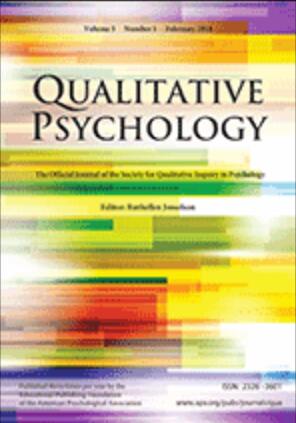Applying the framework method to qualitative psychological research: Methodological overview and worked example.
IF 14.3
Q2 Psychology
引用次数: 1
Abstract
This article is presented in two parts. First, an overview of the Framework Method is given, a contemporary method of qualitative analysis for psychological research. The method's background, distinguishing features, seven steps of data analysis, and suitability to psychological research are discussed. Second, to demonstrate how the method can be applied to a psychological study, a worked example of the analytical steps is detailed. This article aims to (a) demonstrate the utility and appropriateness of the Framework Method for qualitative research in the psychological sciences and (b) support researchers who might consider using this method by providing a worked example to illustrate how this method can be utilized in psychological research. The Framework Method has been widely used in social and public policy-based research, and more recently, health research, but rarely in psychology. It differs from other qualitative approaches due to its emphasis on matrix-based data summary and display, which supports the systematic generation of themes. The Framework Method will be applied to data collected from participants in Australia. The study described in the worked example explored the impact of COVID-19 on parent-adolescent relationships. Across seven steps, the authors explain how data were analyzed, which are followed by a reflective discussion on the use of the method, including strengths and limitations. This article will provide a methodological overview and worked example of the Framework Method for the psychological sciences. It will support psychological researchers to better understand and consider adopting this method in their qualitative research. (PsycInfo Database Record (c) 2022 APA, all rights reserved)框架方法在定性心理学研究中的应用:方法论综述与实例。
本文分为两部分。首先,概述了框架方法,这是当代心理学研究的定性分析方法。论述了该方法的产生背景、特点、数据分析的七个步骤以及在心理学研究中的适用性。其次,为了演示该方法如何应用于心理学研究,详细介绍了分析步骤的一个工作示例。本文旨在(a)证明框架方法在心理科学定性研究中的实用性和适当性,(b)通过提供一个工作实例来说明如何将该方法用于心理学研究,从而支持可能考虑使用该方法的研究人员。框架方法已广泛用于基于社会和公共政策的研究,以及最近的卫生研究,但很少用于心理学。它不同于其他定性方法,因为它强调基于矩阵的数据总结和显示,支持系统地生成主题。框架方法将应用于从澳大利亚参与者收集的数据。工作示例中描述的研究探讨了COVID-19对亲子关系的影响。在七个步骤中,作者解释了数据是如何分析的,随后是对该方法使用的反思性讨论,包括优点和局限性。本文将为心理科学提供框架方法的方法论概述和工作实例。这将有助于心理学研究者更好地理解和考虑在他们的定性研究中采用这种方法。(PsycInfo数据库记录(c) 2022 APA,版权所有)
本文章由计算机程序翻译,如有差异,请以英文原文为准。
求助全文
约1分钟内获得全文
求助全文
来源期刊

Qualitative Psychology
Psychology-Psychology (all)
CiteScore
7.80
自引率
0.00%
发文量
15
期刊介绍:
The mission of Qualitative Psychology journal is to foster innovative methods, theories, and empirical research in qualitative inquiry within psychology. The journal aims to highlight the unique contributions of qualitative research in advancing psychological knowledge. Published studies not only explore substantive topics but also address issues related to epistemology, the philosophy of science, and methodological criteria that impact the formulation, execution, and interpretation of qualitative research.
Qualitative Psychology promotes a diverse range of methodological approaches, including narrative, discourse analysis, life history, phenomenology, ethnography, action research, and case study. Additionally, the journal puts emphasis on discussing the teaching and training of qualitative research methods to develop competent qualitative researchers.
 求助内容:
求助内容: 应助结果提醒方式:
应助结果提醒方式:


